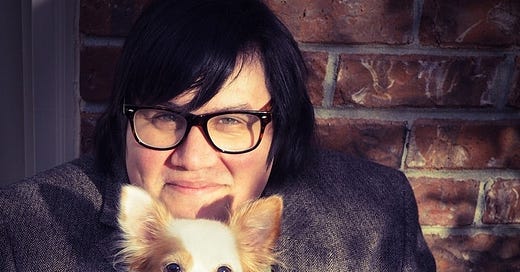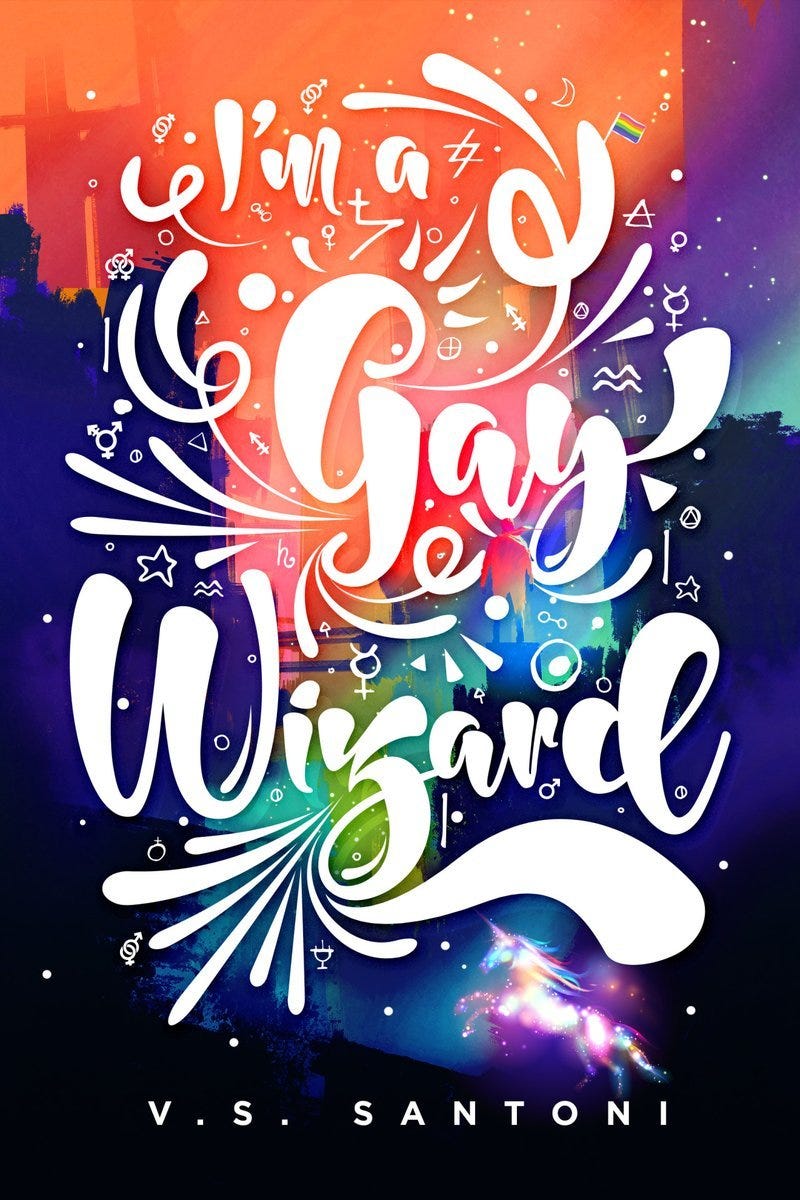First off, tell us a little about yourself. How do you see yourself as a writer?
My nom de plume is Vega, hence V; I’m 34, live in Nashville with my husband and our dog, studied psychology in college, and, as a writer, I’m currently fixing up my (hopeful) debut WIP (Gay Wizard, which is in its—very—incomplete form on Wattpad). I hope to use my interests in surrealism, horror, romance, and Joss Whedon to carve my own niche in the LGBT+ YA realm. However, my true dream is to write the Neuromancer of the dreampunk genre by finishing this project I’ve sidelined for years to work on Gay Wizard.
Right on. I’m in the early stages of a project like that myself. When people ask what dreampunk is, I’d love to be able to point to a novel or two and just say, “That!” What does “dreampunk” mean to you personally? Where did you first encounter the term?
I’ve been obsessed with dreams since I started writing when I was young. Then I became obsessed with surrealist films and literature, especially the films of David Lynch and the writings of William S. Burroughs. I came across the term while doing research on cyberpunk, saw it on Wikipedia, realized how underdefined it was as a genre, and became obsessed with further defining it. Dreams would always play a big role in my writing anyway, so why not, I figured.
“Punk” connotes a DIY aesthetic; the “punk” scene of the 1970s was also a sociopolitical backlash to the rise in conservatism, so I think anything with the suffix “-punk” is first and foremost a critique of traditional social mores and authoritarianism.
William Gibson extended this conceit in the early ’80s by fusing the high technology of science fiction with the low lifestyles of people living in the streets. Gibson’s quote from Burning Chrome: “…the street finds its own uses for things” is a theme that permeated almost all cyberpunk derivatives.
So for me, anything properly “dreampunk” will be speculative—probably with strong science fiction elements (psychics, tech, etc.)—but try to address how ordinary people and rebels use this science in a, usually, authoritarian context. Sorry for the mouthful.
No, that was great! You’ve obviously given this a lot of thought. In this context of dreampunk, what would you say constitutes a “dream”? Would a mystic vision count? A psychedelic trip? A system of delusions, as in Don Quixote? How about a computer simulation, as in The Matrix?
I guess, for me, because it’s speculative, it would have to be an actual dream, whether stated or implied—more Inception and less Matrix, I guess.
Fair enough. Have you ever pulled anything specific from a dream to include in your writing?
All. The. Time. Lol.
Haha, okay then, check. Which writers have influenced you the most? You’ve mentioned Burroughs and Gibson so far. Those two seem to point right to dreampunk.
I’ve seen you list Haruki Murakami before, and Kafka on the Shore is actually what got me into surrealist lit, so I agree with that one. And there would be no William Gibson without Philip K. Dick. I guess I would add Neil Gaiman, H. P. Lovecraft, and Franz Kafka. These writers got me into surreal stories in general, so the trip over to dreampunk was a natural progression.
You seriously just named all my favorites. Kafka on the Shore was my first Murakami and a total game-changer for me too. With its setting split between the big city and an isolated cabin in the woods, that one’s a really good example of the sort of tension between nature and the modern world that I see a lot in dreampunk. As far as your own work, do you lean more toward the city or the wilderness? What sort of setting do you think is ideal for dreampunk?
I love the city/nature dichotomy! I could go on a rant about the scientific and philosophical implications of the dichotomy to me. For my shelved WIP, I used an urban setting because dirty, water-stained cement and rusty metal were nightmarish to me, and I wanted that stark, heavy feel. But you could easily make the countryside dreamy/nightmarish depending on what sides you’re focusing on, just like the city. I think it depends on what you’re trying to say, scientifically or philosophically, and the kinds of archetypes, metaphors, etc. you want to use.
Indeed. So what are you trying to say? How do you hope to shape the dreampunk genre with your work?
My philosophical interest is finding truth in a post-truth world.
I think that dreams are the truth of how we emotionally perceive the world. Because no one’s perceptions are the same, no one’s dreams are the same, but what if we could dialectically find the truth of a situation by reconciling contradictions?
One of the most interesting things to me is that every time we get a really deconstructed, postmodern narrative, people collectively begin to reassemble the pieces to find the answers. They analyze, argue, and eventually start forming a collective truth about the narrative. I think that’s because we like truths, real answers to questions, and I think what we tend to do is define a truth through consensus, almost like we’re a hivemind operating in some collective unconscious.
If a typical po-mo narrative is about abstracting the truth until it only has subjective meaning, I want to work my way backward, starting at the deconstructed shards, form an empathetic connection to my reader and lead them, through implication, to what I’m actually trying to say, to an objective answer, to the truth.
I love that. How can we support you in your work? Do you have anything for sale yet?
In terms of sales, I’m still polishing up Gay Wizard for mainstream publication, so unless you want to be a beta reader or something, I can’t really think of any way I could ask you to support my writing. Thank you so much for asking, though! I’m just glad to be part of a community of content creators who are looking to develop this nascent genre!
I’m a Gay Wizard (2019) by V. S. Santoni
Johnny and his best friend Alison pass their summer holidays dabbling in magic, never expecting it to have consequences. But when they draw the attention of the Marduk Institute, they are whisked away to a school for wizards and told they can never return to their old lives. Pulled into a dark, supernatural fight that could cost them their lives, they’ll have to find strength they never knew they had as they battle for love, acceptance, and their own happy endings.
Update: V. S. Santoni contributed to the dreampunk short story collection Somniscope (2023)!




